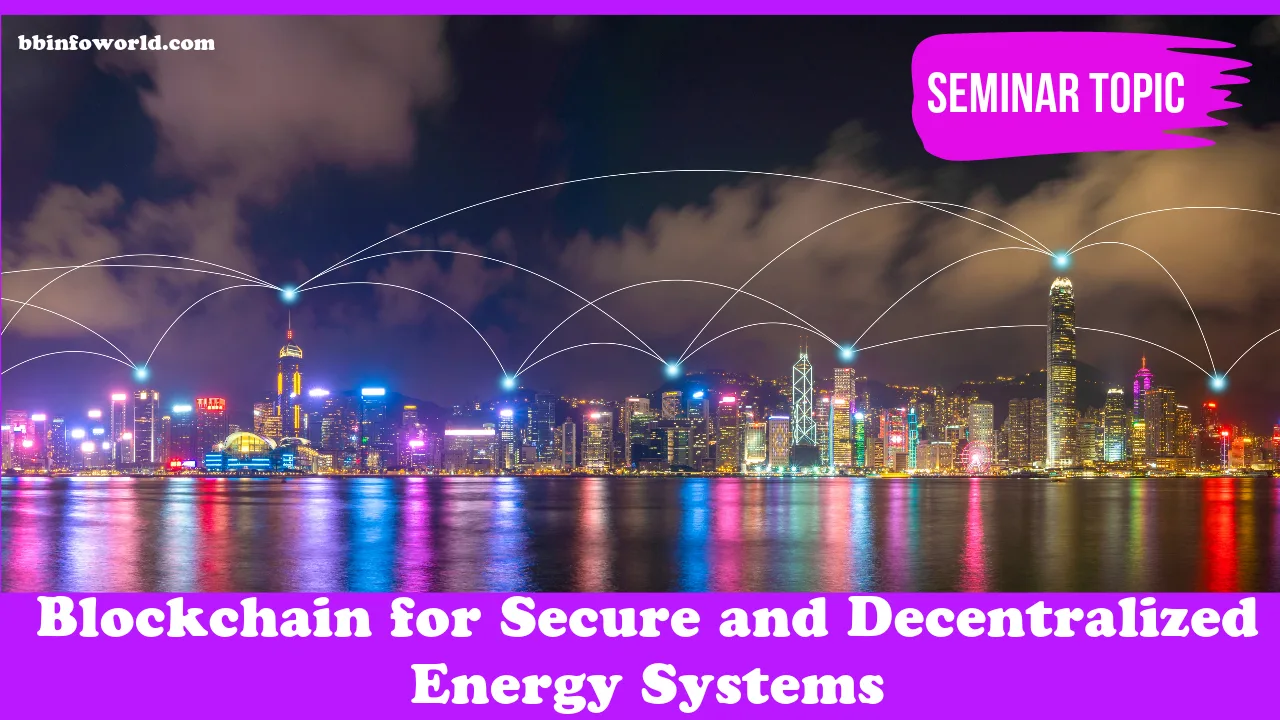
Blockchain for Secure and Decentralized Energy Systems
Explore how blockchain technology can be applied to create secure and transparent energy trading platforms, enabling peer-to-peer energy transactions and enhancing grid resilience.
Blockchain for Secure and Decentralized Energy Systems:
In recent years, blockchain technology has gained significant attention for its potential to revolutionize various industries, including the energy sector. This seminar topic explores how blockchain can be harnessed to create secure and decentralized energy systems, specifically focusing on energy trading platforms, peer-to-peer transactions, and grid resilience enhancement.
Introduction to Blockchain Technology:
Blockchain is a distributed and immutable digital ledger that records transactions across a network of computers. Each transaction, or “block,” is linked to the previous one, forming a chronological chain. This decentralized and tamper-proof nature makes blockchain highly secure and transparent.
Challenges in Traditional Energy Systems:
Traditional energy systems often involve centralized authorities and intermediaries for energy generation, distribution, and trading. This can lead to inefficiencies, lack of transparency, and vulnerability to cyberattacks. Decentralization and transparency are critical for creating a more resilient and efficient energy ecosystem.
Blockchain’s Role in Energy Systems:
- Decentralized Energy Trading: Blockchain enables peer-to-peer energy trading, allowing individuals and organizations to buy and sell excess energy directly to each other. Smart contracts, self-executing code on the blockchain, facilitate automated transactions based on predefined conditions (e.g., price, availability).
- Transparency and Traceability: Every energy transaction is recorded on the blockchain, creating an auditable and transparent record of energy generation, consumption, and trading. This transparency builds trust among participants and reduces fraud.
- Enhanced Security: Blockchain’s cryptographic techniques ensure the security and integrity of energy transactions. It significantly reduces the risk of cyberattacks and unauthorized access.
- Grid Resilience: By decentralizing energy generation and distribution, blockchain can enhance grid resilience. Distributed energy resources (DERs) like solar panels and wind turbines can be integrated seamlessly into the grid, improving flexibility and reliability.
Implementing Blockchain in Energy Systems:
- Smart Metering: Smart meters equipped with blockchain technology can record real-time energy consumption and generation data. This data is securely stored on the blockchain and can be accessed by authorized parties.
- Tokenization of Energy: Energy units can be represented as digital tokens on the blockchain. Users can trade these tokens, representing actual energy, without the need for intermediaries.
- Microgrids and Local Energy Communities: Blockchain can facilitate the creation of microgrids and local energy communities where participants can share and trade energy locally.
Benefits and Future Implications:
- Energy Efficiency: Peer-to-peer trading encourages efficient energy use by incentivizing users to produce, consume, and trade energy at optimal times.
- Reduced Costs: Eliminating intermediaries and automating transactions lowers transaction costs and overall energy expenses.
- Renewable Energy Integration: Blockchain supports the integration of renewable energy sources into the grid by enabling efficient management and trading of energy.
- Energy Access: Decentralized systems can improve energy access in remote or underserved areas, empowering communities to generate and share their energy.
Conclusion:
Blockchain technology has the potential to transform energy systems by creating secure, transparent, and decentralized platforms for energy trading and distribution. Through its ability to facilitate peer-to-peer transactions, enhance grid resilience, and enable efficient utilization of energy resources, blockchain offers a promising path toward a more sustainable and resilient energy future.



